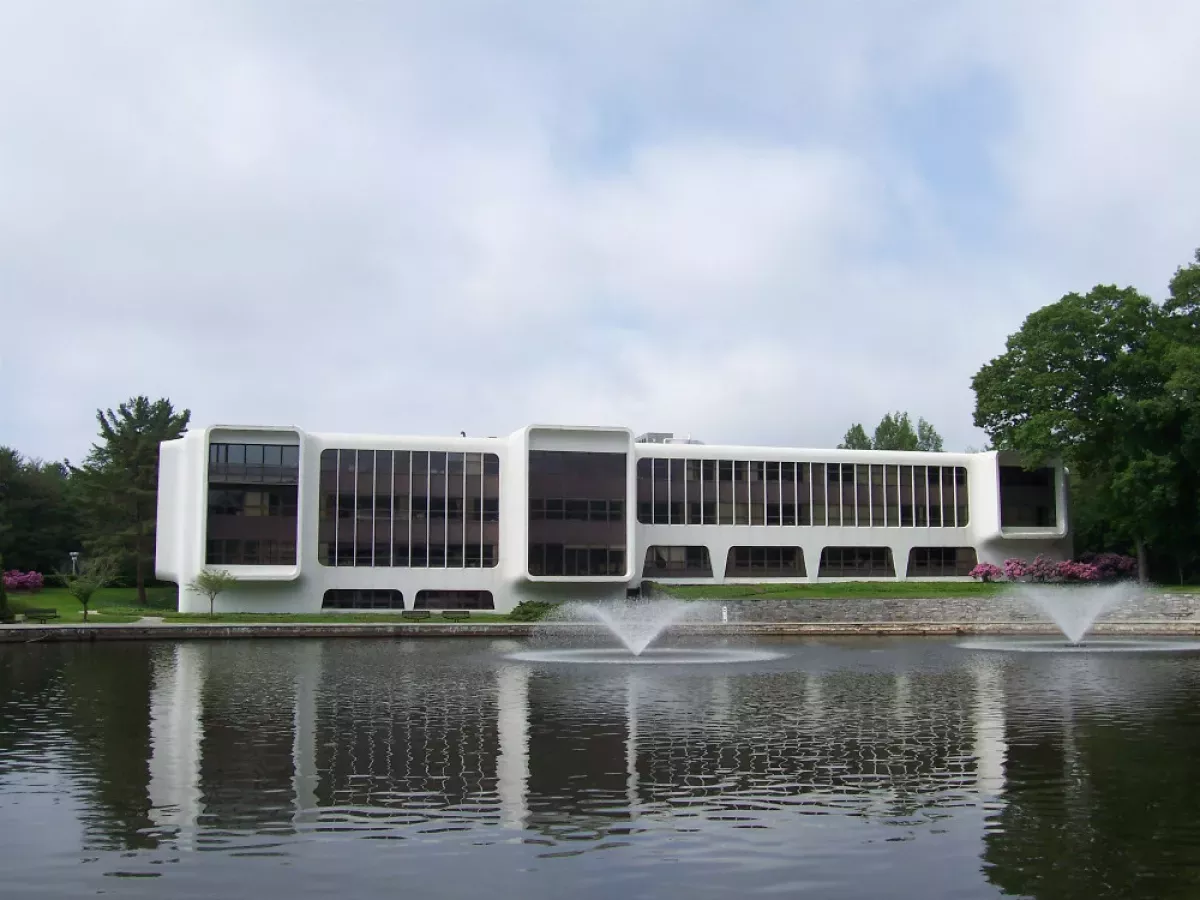Frontier Communications is an American telecommunications company providing broadband internet, digital television, and technical support to residential and business customers across 25 states. Formerly known as Citizens Utilities Company and Citizens Communications Company, Frontier boasts a fiber-optic network and cloud-based services. While its primary offerings center on internet and television, it also provides home phone services in select locations. The company rebranded as Frontier Communications Parent, Inc. in 2020.
1935: Citizens Utilities Company Formed
In 1935, Citizens Utilities Company was formed from the remnants of Wilbur B. Foshay's Public Utilities Consolidated Corporation, originally based in Minneapolis, Minnesota.
1945: Richard Rosenthal Hired as President
In 1945, Richard Rosenthal was hired as president of Citizens Utilities Company, marking a significant change in the company's leadership.
1946: Richard Rosenthal Becomes Youngest Company President
By 1946, Richard Rosenthal became the youngest company president in the industry at the age of thirty, highlighting his rapid rise in leadership.
1969: Kauai Electric Company Acquisition
In 1969, Citizens Utilities Company purchased the Kauai Electric Company, marking its then largest acquisition and expanding its operations to 27 subsidiaries in five industries across a dozen states.
1970: Rosenthal Elected Chairman
In 1970, while continuing to serve as CEO, Rosenthal was elected chairman of Citizens Utilities Company, consolidating his leadership role.
1981: Ishier Jacobson Succeeds Rosenthal as CEO
In 1981, Ishier Jacobson succeeded Richard Rosenthal as CEO of Citizens Utilities Company after serving as president and COO, marking a transition in executive leadership.
1986: Acquisition of AAlert Paging Company
Citizens acquired AAlert Paging Company in 1986, later selling it in 1993.
1989: Rosenthal Retires as Chairman
In 1989, Richard Rosenthal retired as chairman of Citizens Utilities Company, concluding his long tenure in a leadership position.
1990: Acquisition of Louisiana General Services
In 1990, Citizens acquired Louisiana General Services, which was the largest natural gas distribution company in Louisiana, expanding its utilities portfolio.
1990: Leonard Tow Named Chairman and CEO
In 1990, after Jacobson retired, board member Leonard Tow was named chairman and CEO of Citizens Utilities Company, with Daryl Ferguson becoming president later that year, signaling a new direction for the company.
1991: Acquisition of Southern Union Company's Gas Operations and Creation of Centennial Cellular
In 1991, Citizens acquired the gas operations of Southern Union Company in Arizona. Additionally, Citizens created Centennial Cellular by merging its Citizens Cellular subsidiary with Century Cellular, retaining a 32% ownership stake in the new company.
1993: Sale of AAlert Paging Company and Agreement to Acquire Rural Access Lines from GTE
In 1993, Citizens sold AAlert Paging Company after acquiring it in 1986. Under chairman and CEO Leonard Tow, Citizens Utilities also agreed to acquire 500,000 rural access lines from GTE.
June 1994: Acquisition of Additional Lines in New York
In June 1994, Citizens added 270,000 lines in New York from Contel of New York into Citizens Telecommunications Company of New York.
1994: Announcement of Alltel Acquisition
In 1994, Citizens announced that it would acquire 117,000 telephone lines and cable franchises in eight states from Alltel for $292 million, expanding its service area.
January 1995: Merger of GTE Access Lines into Citizens Telecommunications Company of California
In January 1995, 5,000 more GTE access lines were merged into Citizens Telecommunications Company of California.
June 30, 1995: Completion of First Alltel Operating Company Acquisitions
On June 30, 1995, the first acquisitions of two Alltel operating companies were completed. One was merged into Citizens' existing company in Oregon, while Mountain State Telephone in West Virginia was renamed Citizens Mountain State Telephone.
September 1995: Transfer of Alltel Lines to Citizens Telecommunications Company of the Volunteer State
In September 1995, some of the Alltel lines were officially transferred to Citizens Telecommunications Company of the Volunteer State in Tennessee. Citizens also acquired Alltel's Navajo Communications that year.
1995: Expansion into 18 States
By the start of 1995, Citizens had expanded into 18 states with major subsidiaries such as Electric Lightwave, offering services including telecommunications, natural gas, electric, water, and wastewater treatment.
1996: Acquisition of Alltel Lines in Pennsylvania, California, and Nevada
In 1996, Citizens acquired Alltel lines in Pennsylvania, California, and Nevada, with Alltel Nevada renamed Citizens Telecommunications Company of Nevada, further expanding its service territory.
1996: Naming Rights Deal
In 1996, Frontier signed a 20-year naming rights deal when Frontier Field opened in Rochester, New York.
1997: Acquisition of Ogden Telephone
Citizens acquired Ogden Telephone in 1997, continuing its expansion in the telecommunications sector.
October 1999: Sale of Water and Wastewater Operations to American Water
In October 1999, Citizens' water and wastewater operations were sold for $835 million to American Water, as part of its strategy to focus solely on telecommunications.
December 1999: Agreement to Acquire Additional GTE Lines
In December 1999, GTE agreed to sell another 106,850 phone lines in Illinois to Citizens for $303 million, expanding its telecommunications infrastructure.
1999: Focusing on Telecommunications
In 1999, the company began focusing solely on telecommunications, selling its natural gas assets and utility operations to concentrate on this sector.
February 2000: Sale of Electric Utility Operations
In February 2000, Citizens sold its electric utility operations for $535 million as it continued to divest from non-telecommunications assets.
April 2000: Sale of Louisiana Natural Gas Assets to Atmos Energy
In April 2000, Citizens sold its Louisiana natural gas assets to Atmos Energy for $375 million, completing its exit from the natural gas business.
2000: Renamed to Citizens Communications Company
In 2000, Citizens Utilities Company was renamed Citizens Communications Company, marking a shift in the company's branding and identity.
July 2001: Acquisition of Frontier Name and Assets from Global Crossing
In July 2001, Citizens Communications acquired assets and the Frontier name from Global Crossing for $3.65 billion, marking a significant expansion in its telecommunications business.
2002: Sale of Remaining Water and Wastewater Operations and Utilities
In 2002, Citizens Communications Company sold its remaining water and wastewater operations to American Water Works, along with its Kauai Electric Company and Gas Company of Hawaii, generating a total of $1.9 billion from selling off its utilities.
2003: Sale of Arizona Electric and Gas Utilities to UNS Energy
In 2003, Citizens Communications sold its Arizona electric and gas utilities to UNS Energy, continuing its divestiture of utility assets.
2004: Sale of Vermont Electric Divisions
In 2004, Citizens Communications sold its Vermont electric distribution division to Vermont Electric Cooperative and its Vermont transmission system to the Vermont Electric Power Company.
2006: Acquisition of Commonwealth Telephone
In 2006, Citizens Communications acquired Commonwealth Telephone, a Pennsylvania telephone company, expanding its telecommunications holdings.
July 31, 2008: Renamed to Frontier Communications Corporation
On July 31, 2008, Citizens Communications changed its corporate name to Frontier Communications Corporation, with the company's stock symbol on the New York Stock Exchange changed from "CZN" to "FTR".
May 2009: Announcement of Verizon Wireline Business Acquisition
In May 2009, Frontier announced it would acquire Verizon's wireline businesses in multiple states for $8.6 billion, significantly expanding its service area.
June 2010: Frontier Sues Google Over Google Voice
In June 2010, Frontier Communications sued Google over Google Voice, alleging the product infringed on its own invention to link multiple phone lines to a single number. The product "Google Voice" is a mobile-app.
July 2010: Closing of Verizon Wireline Business Acquisition
In July 2010, the sale of Verizon's wireline businesses to Frontier closed, tripling Frontier's customer base from 2.3 to 7 million in 27 states. The deal encapsulated Verizon's phone, cable TV, and internet service businesses in much of the western United States.
February 2011: Substantial Rate Increases for FiOS TV
In February 2011, Frontier substantially raised the rates for FiOS TV, by 50% in some regions, citing rising programming costs. It also instituted a $500 installation fee for new television subscribers.
December 16, 2011: Move to NASDAQ Stock Exchange
On December 16, 2011, Frontier moved from the NYSE to the NASDAQ stock exchange, trading under the same "FTR" symbol.
2011: Naming Rights to Frontier Ice Arena
In 2011, Frontier purchased the naming rights to the Frontier Ice Arena in Coeur d’Alene, Idaho.
2012: Initial Claim of No Price Changes for FiOS TV
Frontier had initially claimed it had no plans to change FiOS TV prices until 2012, before substantially raising the rates in February 2011.
2013: Broadband Access Expansion Requirement
By 2013, Frontier was required to increase broadband access to 85% of subscribers in all of its territories as part of the Verizon acquisition agreement.
October 24, 2014: Acquisition of AT&T's Connecticut Operations
On October 24, 2014, Frontier acquired AT&T's operations in Connecticut, including wireline, DSL, U-verse video, and satellite TV businesses for $2 billion, merging various subsidiaries into Frontier Communications of Connecticut.
April 2015: Daniel J. McCarthy Succeeded Maggie Wilderotter as CEO
In April 2015, Daniel J. McCarthy succeeded Maggie Wilderotter as CEO of Frontier, marking a change in the company's leadership.
2015: Naming Rights Deal Re-optioned
In 2015, the naming rights deal for Frontier Field was re-optioned.
April 1, 2016: Acquisition of Verizon's TV, Internet, and Landline Phone Business in Florida, Texas, and California
On April 1, 2016, Verizon sold its TV, internet, and landline phone business in Florida, Texas, and California to Frontier for $10.5 billion, doubling Frontier's size.
2016: Poor Satisfaction Ratings
In 2016, outlets such as Consumer Affairs reflected the sentiment that Frontier's DSL service was at or near the bottom in terms of "Overall Satisfaction".
2017: Title Sponsor of Basketball Championships
In 2017, Frontier was the title sponsor of the American Athletic Conference's Men's and Women's basketball championships.
February 2018: Experienced an 8% Annual Revenue Decline
In February 2018, Frontier experienced an 8% annual revenue decline, outpacing attempts to cut costs, signaling financial challenges.
2018: UCaaS Option Launched
In 2018, Frontier launched a cloud-based unified-communications-as-a-service (UCaaS) option for businesses.
2019: Frontier DSL Service Ranked Poorly
In 2019, PC Magazine's annual survey of ISP customer satisfaction again listed Frontier's DSL service at or near the bottom in terms of "Overall Satisfaction".
January 2020: Bloomberg News Report on Potential Bankruptcy
In January 2020, Bloomberg News reported that Frontier was "asking creditors to help craft a turnaround deal" that potentially included filing for bankruptcy, highlighting the company's financial distress.
April 14, 2020: Filed for Bankruptcy
On April 14, 2020, Frontier Communications filed for bankruptcy, initiating a restructuring plan to reduce debt.
May 1, 2020: Sale of Northwest Operations to WaveDivision Capital and Searchlight Capital Partners
As part of the restructuring plan, on May 1, 2020, Frontier sold its Northwest operations in Idaho, Montana, Oregon, and Washington to WaveDivision Capital and Searchlight Capital Partners for $1.352 billion, with the acquired operations renamed Ziply Fiber.
2020: Filed for bankruptcy
In 2020, Frontier filed for bankruptcy as part of a restructuring effort to address its financial challenges.
2020: Rebranding of Fiber Systems and Licenses
In 2020, Frontier rebranded the fiber systems and licenses it acquired from Verizon, discontinuing the "FiOS" name.
March 4, 2021: Nick Jeffery Became CEO and President
On March 4, 2021, Nick Jeffery became CEO and president of Frontier, succeeding Daniel J. McCarthy and signaling a new phase for the company after restructuring.
March 2021: Emergence from Restructuring
In March 2021, Frontier emerged from restructuring, describing a new focus on converting its copper-based telecom network into fiber optic cable and improving customer service.
May 4, 2021: Went public again on the NASDAQ
On May 4, 2021, Frontier went public again on the NASDAQ, emerging from restructuring and signaling a new phase for the company.
2021: Frontier Stopped Marketing TV to New Customers
In 2021, Frontier stopped marketing TV with traditional linear video ads to new customers, though some continued to be offered the service through legacy contracts.
May 2022: Frontier Settles with FTC
In May 2022, Frontier settled with the Federal Trade Commission over allegedly not delivering promised internet speeds in California, agreeing to pay the state $8.5 million.
2022: Fiber Network Expansion
At the end of 2022, Frontier's fiber network reached 5.2 million locations.
January 2023: Frontier Launches 5-Gigabit Speeds
In January 2023, Frontier launched 5 gigabit speeds for its entire fiber network, becoming the first nationwide internet service provider to do so.
May 2023: Frontier Fiber 500 Named Best Internet Deal
In May 2023, David Anders of CNET named Frontier Fiber 500 as the "best internet deal overall" offered by an American ISP, praising its fast speeds, TV bundle, unlimited data, free wifi router, lack of term agreements, and suitability for online gaming.
November 2023: Largest Investor in Frontier
As of November 2023, Ares Management was the largest investor in Frontier, owning a 16% stake in the company, followed by Cerberus Capital Management, which owned a 10% stake.
2023: Fiber Service Expansion
As of 2023, Frontier offered fiber service in regions of 15 states, while some regions had DSL options without fiber, and other regions lacked DSL internet.
September 5, 2024: Verizon Announced Intent to Acquire Frontier
On September 5, 2024, Verizon announced its intent to acquire Frontier for $20 billion, in a move to expand its fiber internet services.
November 2024: Frontier Acquisition Approved
In November 2024, Frontier shareholders approved the acquisition by Verizon.
2025: Planned Expansion
In 2022, Frontier outlined plans to reach 10 million connected homes by 2025.
2026: Fiber Optic Goal in Connecticut
In early 2023, Frontier aimed to have 90% of its customers in Connecticut connected to fiber optic cable before 2026.
Mentioned in this timeline

Basketball is a team sport played on a rectangular court...

Google LLC is a multinational technology company specializing in online...
California is a U S state on the Pacific Coast...

Verizon Communications is a leading American telecommunications company headquartered in...
Arizona is a landlocked state in the Southwestern U S...
Pennsylvania is a U S state located in the Mid-Atlantic...
Trending
31 minutes ago Rose Byrne shares insights into family life with Bobby Cannavale, addresses award shows.

2 hours ago Scream 7 trailer released, Isabel May joins cast, working with Neve Campbell.

2 hours ago Rafael Jódar Receives Acapulco ATP 500 Wildcard, Faces Cameron Norrie

2 hours ago Norrie vs. Jódar: ATP Acapulco 2026 Match Preview, Odds, and Predictions

3 hours ago Elliott Management targets Norwegian Cruise; Katy Perry connection surfaces in activist campaign.

3 hours ago Carrie Underwood enjoys cleaning toilets and embraces 'granny hobbies' on her Tennessee farm.
Popular

Jesse Jackson is an American civil rights activist politician and...

Barack Obama the th U S President - was the...

Bernie Sanders is a prominent American politician currently serving as...

Susan Rice is an American diplomat and public official prominent...

XXXTentacion born Jahseh Dwayne Ricardo Onfroy was a controversial yet...

Michael Joseph Jackson the King of Pop was a highly...
